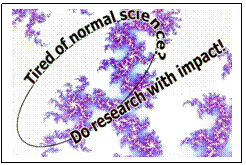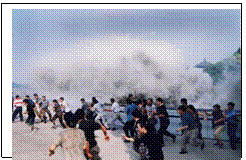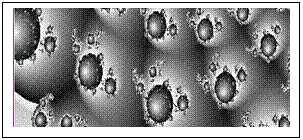About the Society --
Our members hail from numerous specialties within psychology, other social sciences, and biology, physiology, neuroscience, mathematics, philosophy, physics, computer science, economics, education, management, political science, engineering, and the world of art. We have approximately 350 members in more than 30 countries. |
What is Chaos Theory?"Chaos Theory" is one of a set of approaches for studying nonlinear phenomena. Specifically, chaos is a phenomenon that appears locally unpredictable may indeed be globally stable, exhibit clear boundaries, and display sensitivity to initial conditions. Small differences in initial states eventually compound to produce markedly different end states later on in time. "Catastrophe theory" models the dynamics of phenomena that exhibit both continuous and discontinuous changes over time. “Complexity theory” is concerned with self-organizing phenomena, and the effect of one subsystem on the behavior of another. Chaos, catastrophe, and complexity theories are all examples of “nonlinear dynamical systems theory.” The latter is an umbrella term for the study of phenomena such as attractors, bifurcations, chaos, fractals, catastrophes, and self-organization, all of which describe systems as they change over time. To learn more about our subject matter, please switch to our Chaos and Complexity Resources for Students and Teachers.There you will find patient explanations, tutorials, reading lists, and other necessities for getting started in nonlinear science. This area of the web site will be expanding again soon. Be sure to bookmark the page for future visits. |
SCTPLS Conferences
The SCTPLS Annual International Conference offers a unique intellectual and social atmosphere that stimulates dialogue. The program includes symposia, roundtables, single papers, workshops, the business meeting, and prominent guests. Presentations may be theoretical, applied, empirical, or methodological in content. The atmosphere is friendly to beginners and challenging for our vanguard scientists as well. Some of the specialty tracks that we have featured include: clinical psychology, physiology, mathematics and methodology, ecology, sociology, economics, cognitive psychology, communication, organizations, public policy, and philosophy of science. Conference locations are all within the United States and occasionally Canada, in July and August. The annual conferences draws members from worldwide origins. Members receive substantial discounts on their conference registration. This benefit alone is well worth the membership. The International Nonlinear Science Conference series is another effort to reach out to scientists who are located in other parts of the world. To date the International Nonlinear Science Conferences have been held in Vienna (Austria), Heraklion (Crete, Greece), Tokyo (Japan), and Palermo (Sicility, Italy) You can browse our conference news, abstracts, and archives by switching to Conferences. We are not bashful about announcing calls for papers and related conference news on this website, in the SCTPLS Newsletter, and in other electronic or print media. |
An index of key words is available. Each annual volume features an artist who incorporates nonlinear thinking into their artwork. Cover artists have included to date: J. C. Sprott, Richard P. Taylor, Gert van Tonder, Tobi Zausner, Scot 'Spot' Draves, Daniel Della-Bosca, and Rob Harle in 2010. Please visit the NDPLS pages for a full listing of titles, authors, abstracts, and more. Subscriptions to NDPLS are available to institutional libraries in print or electronic form. |
SCTPLS Newsletter
|
More Electronic Resource
Got a question? Need an expert? Try our listservers. Someone is always there to help. The SCTPLS listsever is a good way to find members with interests similar to yours at a moment’s notice. CHAOPSYC and CHAOFORUM are designed for extended discussions. |
Society Officers & Staff
|
Postal correspondence for general business:SCTPLS, P. O. Box 484, Pewaukee, WI 53072 USAFaxes should be sent to: 1-414-288-5333
|
Historical List of Presidents:
|
 The Society is an international forum that brings together researchers, theoreticians, and practitioners interested in applying dynamical systems theory, self- organization, neural nets, fractals, cellular automata, agent-based modeling, and related forms of chaos, catastrophes, bifurcations, nonlinear dynamics, and complexity theories to psychology and the life sciences.
The Society is an international forum that brings together researchers, theoreticians, and practitioners interested in applying dynamical systems theory, self- organization, neural nets, fractals, cellular automata, agent-based modeling, and related forms of chaos, catastrophes, bifurcations, nonlinear dynamics, and complexity theories to psychology and the life sciences.

 Members also receive the quarterly
Members also receive the quarterly  The Society's dynamic web site (you are here!) provides you with information about our members, NDPLS, "Fractal of the Day", "Featured Site", conference archives, the
The Society's dynamic web site (you are here!) provides you with information about our members, NDPLS, "Fractal of the Day", "Featured Site", conference archives, the